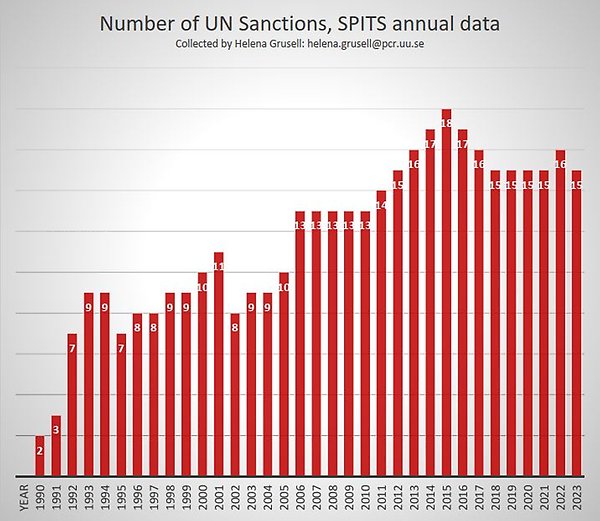The SPITS Sanctions List
SPITS works specifically on sanctions that have been used by the UN Security Council according to Chapter VI and Chapter VII of the UN Charter. This website lists all ongoing and terminated sanctions that have been instituted through such decisions. The list includes all sanctions since the start of the UN and is regularly updated.
The SPITS Sanctions List is organised according to the targeted country. Mostly, sanctions are directed at governments. The Security Council demands compliance with UN decisions. However, sometimes the demands and action are also directed against specified, organised actors. These sanctions are also listed under the targeted country as the concern of these actors mostly deals with the country in question. In cases where only the non-state actors are targeted, that is indicated in the list. Sanctions against international terrorism (which often is global in its goals) are listed separately, under the name of the organisation.
A country may also have been exposed to repeated sanctions experiences for different reasons. These are still listed under country and not identified as separate sanctions.
When sanctions are targeted at two countries that are in conflict with each other this is seen as a separate sanction operation. The countries are identified and separated by marking v. between the names.
When sanctions are targeted at two states involved in the same issue but with no ongoing conflict, the countries are identified and separated with a ‘,’ between the names.
The SPITS Sanctions List is different from the one of the Targeted Sanctions Consortium in Geneva, which focuses on separate UN sanctions episodes for the period 1991-2013. It is also different from the way the UN Security Council identifies cases, which is using the relevant Security Council resolution. The SPITS Sanctions List (pdf) Pdf, 435 kB. is organised to make it more compatible with other state-based lists, for instance, of conflicts (as identified by UCDP) and other types of relevant data, see Grusell 2023.

Number of ongoing UN sanctions, per year, 1990-2023. According to the SPITS definition. Based on Grusell 2023 (for data see below).
SPITS Sanctions List 2023
All Imposed sanctions since SCR 1 (1946) concerning Threat to International Peace and Security.
Current Sanctions
Country | Targeting | SCR (start year) |
| Afghanistan | Non-state Actor (Taliban) | 1267 (1999) |
| Al-Qaida list | Non-state actors | 1989 (2011) |
| CAR | Government + Non-state actors | 2127 (2013) |
| DR Congo | Non-state actors | 1493 (2003) |
| Guinea-Bissau | Government | 2048 (2012) |
| Haiti | Non-state actors | 2653 (2022) . |
| Iraq | Non-state actors (S. Hussein supp.) | 1483 (2003) |
| Lebanon, Israel | Non-state actors | 1701 (2006) |
| Lebanon, Syria | Non-state actors (Hariri assassins) | 1636 (2005) |
| Libya | Government (2011) + Non-state actors | 1970 (2011) |
| North Korea | Government | 1718 (2006) |
| Somalia | Non-state actors | 733 (1992) |
| South Sudan | Government + Non-state actors | 2206 (2015) |
| Sudan | Government + Non-state actors | 1556 (2004) |
| Yemen | Non-state actors | 2140 (2014) |
Terminated Sanctions
The UN Sanctions Organisation
In the United Nations sanctions are dealt with by a set of bodies within the UN Secretariat, based on decisions made in the Security Council. Particularly important are the following:
Department of Political Affairs (DPA)
The mission of the Department of Political Affairs is to provide advice and support on all political matters to the Secretary-General in the exercise of his global responsibilities under the Charter, relating to the maintenance and restoration of peace and security.
Security Council Affairs Division (SCAD)
One of the core functions of SCAD of the Department of Political Affairs is to provide support and services to the work of the Security Council. The Division consists of four organisational units, namely, the Security Council Secretariat Branch, The Security Council Practices and Charter Research Branch, the Military Staff Committee secretariat and the Security Council Subsidiary Organs Branch (SCSOB).
Security Council Subsidiary Organs Branch (SCSOB)
SCSOB of the Division works directly with the sanctions regimes. One of the core functions of the Branch is to provide substantive support and secretariat services to the subsidiary organs of the Security Council, including the Sanctions Committees.
Sanction Committees
Such committees are constituted by the member-states of the Security Council and led by a member. Not all sanctions have sanctions committees. The chair of the committee often has strong impact on the work of the Committee.
Panel of Experts (PoE)
Sanctions Committees may chose to appoint experts that investigate the implementation of particular sanctions. Normally they are termed Panel of Experts, but terminology may vary. The members of a PoE are appointed by the Secretary-General after consultations with the Committee. Typically, a PoE collects information from member-states, who are asked by the Security Council to fully cooperate. The resulting reports constitute important sources for understanding the implementation of sanctions decisions.
Focal Point for De-Listing
Within the SCSOB there is a focal point for individuals that want to question why they have been listed in UN sanctions. For the al-Qaida sanctions this function is called The Office of the Ombudsperson and its independence is emphasized [S/RES/2161 (2014)]. Delisting decisions are made by the relevant Sanctions Committee.
